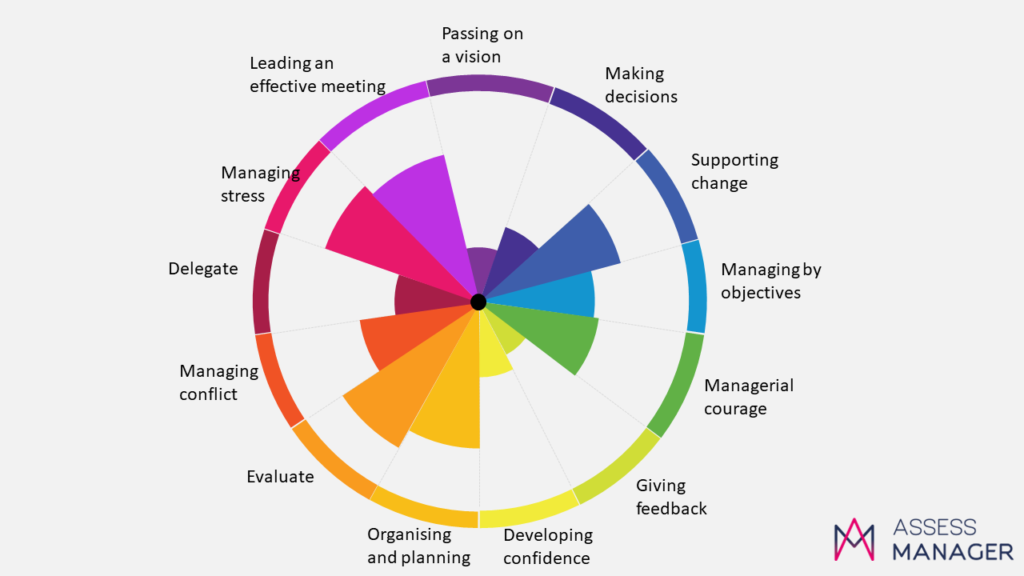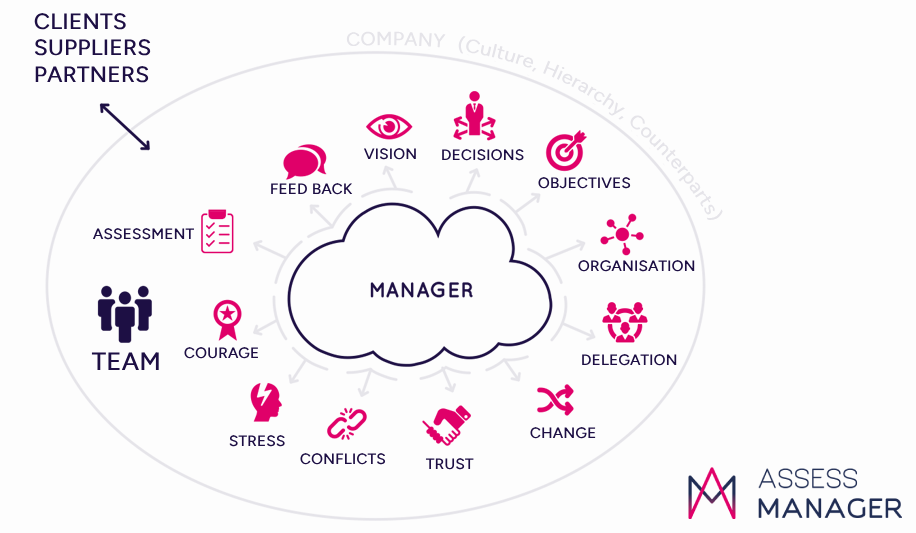A real innovation – 5 years of R&D
23 minutes of questions and scenarios
What is the difference between a Personality Test and a Management Test?
Assess Manager is the management specialist. Our offer focuses on a questionnaire and role-playing exercises which lead to several test reports.
- 23 minutes of questions and scenarios
- A complete ZOOM-ER Personality Assessment: 12 personality traits, each composed of sub-traits.
- A MANAG-ER managerial assessment: Leadership posture and style, values transmitted, 14 skills assessed, degree of agility, etc

ZOOM-ER – The personality test
The ZOOM-ER personality test report provides precise information on the intellectual and emotional brains:
How the person thinks and grasps data, how the person accepts and experiences emotions.
The personality report specifies how the person manages their relationship with time and its organisation, their relationship with individuals and their way of interacting, their relationship with the world and their openness, their relationship with power and their relationship with responsibilities.
It also specifies his or her relationship to stress, and his or her motivational levers.
It’s a descriptive report that combines a person’s inherent preferences with the way they function in the work environment.
MANAG-ER, The management test
The MANAG-ER management test report breaks down managerial skills according to level of responsibility, so that the assessment is as close as possible to the level of responsibility held or desired.
The first part of the management assessment focuses on the manager’s posture, agility and the values transmitted to his team, his political sense and his managerial courage.
The second part of the managerial assessment evaluates the manager’s skills: ability to delegate, to transmit the company’s vision, to provide feedback. 14 skills are precisely evaluated, and documented in a complete book on management.
The 2 reports are the result ofa single questionnaire consisting of 110 questions and role-playing exercises – lasting an average of 23 minutes
Are you interested in the
MANAGEMENT TEST
PERSONALITY TEST

The ASSESS MANAGER Management Test
ASSESS MANAGER Management Test Competency Framework
The management test first identifies general elements and posture. The second part deals with managerial skills, which are measured according to the hierarchical level held or desired.
Managerial posture and positioning in the MANAG-ER report
What questions will this first part answer?
- Is the person better suited to managing teams in the field or at a higher level? In particular, a distinction is made between operational management and management of managers
- What management style does the person use most? Participative? Paternalistic? Delegative? Directing? Does it have a coaching approach?
- What is its degree of overall agility? What is its emotional intelligence? Intellectual intelligence?
- Has she developed a certain political sense?
- Do they have the managerial courage to deliver difficult messages to their teams?
- What values does the manager embody and convey to his or her teams? What is their managerial colour?
Managerial skills in the MANAG-ER report

The second part of the MANAGER report looks at the manager’s talents and skills.
- What specific skills has he been able to develop?
- Meeting facilitation?
- Managerial courage?
- Management by objectives or rather by trust?
- Does he know how to give meaning to his employees’ day-to-day work?
- How does he delegate?
- How does he organise the team’s work? etc…
The assessment of managerial skills in the test distinguishes between operational management and management of managers in order to process and analyse the respondent’s results.
Cross-functional managers use the same skills, but in different proportions, which are explained to you during training.
All the skills are detailed in a table.

Training in how to use the tests is offered.
Training is essential for optimised treatment.
That’s why we offer it to you. Whether you have 1 employee or 50, everyone can take part in the training and receive professional treatment. All new employees can follow the training, which is given on Teams with an online trainer every week.
We work with you as a true partner. Other training courses are available to you as a Human Resources professional.

Training offered: We can help you to get to grips with the questionnaires
questionnaires and interpreting the results.
Register for sessions via your partner area
Do you have to be a manager to take the Assess Manager personality and management test?
The answer is “NO”.
The questions are neutral and are aimed at all employees, managers and even executives. You will be asked about situations both in the workplace and in everyday life – for example, a car accident. The position you occupy is independent of the questionnaire and the situations proposed.
The results are presented according to the level of responsibility for which you are being assessed.
The scenarios and questions can also be used to assess an employee’s potential for a managerial role.
Special features of the ASSESS MANAGER test
The Assess Manager personality and management test is the result of 5 years of research. It combines several theoretical references.

The Big Five approach and neurosciences such as the colour test are used in the Assess Manager approach . We have supplemented the test with theoretical and psychotechnical references in order to deliver a convincing and comprehensive managerial assessment: transactional analysis, Karpman’s triangle and certain NLP metaprogrammes.

The ASSESS MANAGER Personality Test
The ASSESS MANAGER personality test
Personality test – Neuroscience results
The personality test uses metrics and logic fairly similar to what is commonly known as the colour test. It provides a familiar reference framework that is easy to use for anyone trained in this neuroscience approach. This is one part of the test, which sheds light on the major functional tendencies.
A closer look at the different areas below completes this approach.
Intelligence test in the ZOOM-ER Personality Test
BRAIN AND REFLECTION – Questions answered by the personality test
- Is the person capable of grasping complex data?
- Do they have the ability to step back and analyse data?
- To what extent is their thinking influenced by their emotions?
We distinguish between the linear thinking of the scientist, who associates a cause with a consequence in a binary approach of the 0 or 1 type. This is a way of thinking that can involve very advanced reasoning, all the more so if the individual’s brain has developed the ability to apprehend abstraction².
In contrast to the linear brain, we detect brains that function in circular mode, also known as the tree brain. It has other advantages, not least the ability to make links between seemingly distinct subjects. These brains function like a search engine, if we were to make an easy-to-understand analogy. Combined with their capacity for abstraction, they can stand out in the workplace, particularly in the service sector.
The intelligence test proposed in ZOOM-ER shows not only a person’s abilities, but also what their brain implies in their relationship with work, in terms of demands or the need for intellectual nourishment. We also measure speed of thought and the ability to project different time scales. And the way they approach a subject, depending on whether the approach is global or detailed.
Leadership in the ZOOM-ER Personality Test
LEADERSHIP – Questions answered by the personality and management test
- How does this profile position itself when it comes to taking responsibility and initiative?
- What is their relationship with authority and their influence through or on their environment?
- What is their level of confidence and ability to question?
The management report contains elements on Leadership which complete this first approach, in particular by addressing an individual’s ability to unite a team, to impose himself as a leader in a more or less natural or rather authoritarian way.
The distribution of leadership styles is also measured, between paternalistic, participative, authoritarian, delegative and coaching styles. This breakdown enables us to identify the fit with a team or a company’s managerial culture. Leadership may also be better suited to the management of managers than operational management.
So we have leadership indicators that are linked to personality and will be qualified in the personality report.
We also identify leadership styles linked to the managerial posture and the manager’s position in the company, which are specified in the management report and make the link with the corporate cultures in which the manager will be better suited.
Creativity, openness to change and innovation in the ZOOM-ER personality test
CREATIVITY – The questions the personality test answers
- Is this a creative person?
- What form does creativity take when expressed?
- What stimulates creativity?
Creativity can be manual or intellectual, and can be expressed in different ways depending on the direction it takes. It is an important element when it comes to identifying career paths, or validating the suitability of a profile whose job characteristics require a certain amount of creativity.
People gifted with strong intellectual creativity are often more inclined to drive change in companies than to adapt to the changes that are proposed to them.
OPENNESS – INNOVATION – Questions answered by the personality test
- What is their relationship with new technologies and change in general?
- To what extent do they dare to move forward?
- How do they spontaneously position themselves in the face of change?
The way they approach change is a crucial point for companies. A person who doesn’t like to leave their comfort zone is likely to resist change, whereas the ability to adapt has become crucial for certain jobs.
Jobs that are more repetitive and perceived as laborious by some will often be preferred by these profiles, and this characteristic can become a real asset for certain positions.
In the management report, we measure the manager’s attitude to change to identify whether he or she is a potential driver of change, with the ability to make proposals, while also being able to listen to resistance from individuals, so that he or she can unite and involve his or her staff and colleagues in high-impact projects. Other management metrics complete this part of the diagnosis.
Communication, interaction forms and skills in the ZOOM-ER Personality Test
COMMUNICATION, public speaking and listening skills – Questions answered by the personality test
- Does the profile express itself easily?
- To what extent are they transparent?
- How does this profile listen?
- Is public speaking easy?
An individual’s charisma stems from their posture, but also from their ability to express themselves clearly and in a structured way, while at the same time having developed a certain ability to listen to those they are speaking to. Good communication is a comprehensive exercise that also requires the use of silences, and the ability to think through the message not for oneself but rather so that it is intelligible to the other person.
CONFLICT MANAGEMENT AND POSTURE – Questions answered by the personality test
- Can the profile be the source of a power play in a conflict?
- Is there a tendency to feel like a victim?
- Do they have the resources to manage conflict?
- What type of posture do they tend to adopt?
Some people tend to avoid conflict, while others ‘go for it’ and seek it out. In the intermediate zone are profiles that tend to anticipate problems and know how to defuse conflicts before they arise, while others have a real ability to manage conflict, or even to mediate.
The personality report identifies the individual’s operating tendencies. The personality report characterises the manager’s ability to manage the conflicts in which he is involved, and those of his colleagues, to help them take a step back and return to positive and constructive intentions.
MANAGING EMOTIONS – Questions answered by the personality test
- How does the profile manage its emotions?
- How intensely do they express their emotions?
- How do emotions impact on the perception of reality?
- How do they experience other people’s emotions?
The place of emotions and the way in which the individual sets up induced behaviours linked to their ability to use emotions as a resource or as a potential area of perceived or apprehended weakness; the influence of emotions on the individual’s behaviour
SENSE OF COLLECTIVITY – Questions answered by the personality test
- Is teamwork stimulating for this profile?
- How do exchanges take place?
- Is sharing knowledge spontaneous?
Some people are looking for efficiency at work and think that individual work is more conducive to them, while others need the stimulus of the group to feel effective. Sharing information is another challenge for companies. Here we see the individual’s ability to protect or share his or her work spontaneously.
Sense of Result and Organisation at work through the ZOOM-ER personality test
THE CHALLENGE OF OBJECTIVES – Questions answered by the personality test
- How competitive is the profile?
- How much risk will they take?
- Is their sense of results constructive?
- Does the team influence their ability to achieve objectives?
Some people are very results-oriented. They may be collective and involve the group. They can be individualistic and disregard or even oppose the group. Some people are not intrinsically stimulated by the notion of results because their source of motivation may lie elsewhere. Personality tests help to identify this aspect of an individual.
In the management report, we clearly identify a manager’s ability to think through objectives and put them in place, and the way in which he or she relays them to his or her staff to instil a results-oriented challenge.
ORGANISATION AT WORK – Questions answered by the personality test
- How dispersed or focused is this person?
- How does this person structure their work?
- Do they work quickly? Do they produce quality work that borders on perfectionism?
- Can they make themselves available without losing sight of their objectives?
Productivity has been largely designed around these axes. Its spectrum has broadened to include the motivational field linked to the quality of relationships, empowerment and learning. Nevertheless, the intrinsic organisational qualities of an individual are important to take into account in order to characterise their potential taste and their propensity to carry out certain tasks more than others.
In the managerial relationship, we look at the manager’s ability to encourage good organisation in his team. While a person may be highly effective personally, this does not automatically mean that they are capable of organising the work of their team efficiently. This is what we check in terms of managerial skills in one of the areas measured.
Stress Management in the ZOOM-ER Personality Test
STRESS MANAGEMENT – Questions answered by the personality test
- What is the stress level of the person being assessed?
- How do they react to stress? Is it more of a hindrance or a stimulus?
- Is the anxiety level naturally high or does it depend on external pressure?
- What is the dominant source of stress?
Prolonged stress is harmful to health in all circumstances. Positive stress can become a source of emulation, whereas stress experienced in a negative way becomes an activator of tension, over-reactions or, on the contrary, various forms of procrastination. It can activate conflicts, a form of internal disorganisation that is revealed externally.
The personality test helps to identify these elements, while the management report measures the way in which the manager manages his team’s stress, with an ability to create emulation and also to provide the necessary rest phases for the team.
Motivation in the ZOOM-ER Personality Test
MOTIVATION – The questions the personality test answers
- What is the profile’s current level of commitment?
- What are their dominant sources of motivation?
- What degree of stability or concentration do they need?
As part of an assessment, skills review or recruitment process, this section will be an important part of evaluating the fit between a career plan and a person’s motivating factors. This section, supplemented by the neuroscience assessment, can also be used to identify the types of job that best suit the person being assessed.

ASSESSMENT Offer : Assess a candidate’s skills using a range of psychometric tools and a variety of situational exercises
The genesis and distinctive character of the personality test compared with our competitors
The primary aim of Assess manager is to assess managerial skills and attitudes. To do this, the research team has targeted all the personality indicators required for this assessment. The personality report is therefore complete and accurate, yet easy to access with a 1.5 hour training session.
For example, we have segmented the MBTI ‘s famous E/I into 3 sub-categories:
- The Assess Manager Personality and Management Test has an indicator that measures a person’s introversion or extraversion, i.e. their natural inclination to express themselves.
- The personality test offers a second indicator which measures a person’s tendency to express themselves or their more withdrawn, listening stance, which confers a form of discretion, whether chosen or involuntary. It is therefore a question of the behaviour that is really mobilised or the dominant tendency, in an inter-relationship, over and above their natural inclination.
- A third indicator identifies whether the person finds resources in contact with others or in solitude.
The purpose of this example is to show the degree of finesse of the assessments: the results are not the fruit of deduction but of scientific verification.
You will also find indicators of transactional analysis and neuroscience in particular.
PERSONALITY AND MANAGEMENT TEST SUMMARY
A single questionnaire, a range of solutions

To go further with Assess Manager


